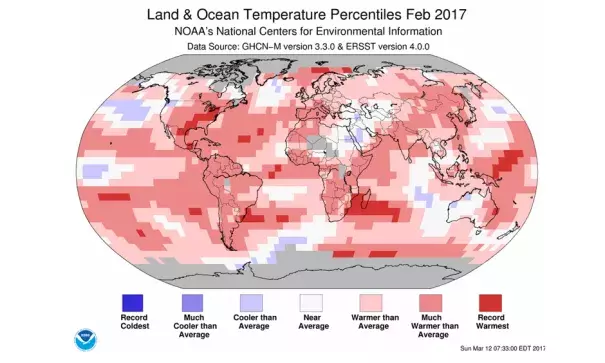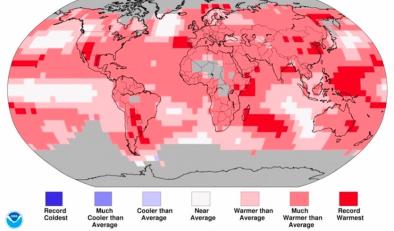February 2017: Earth's 2nd Warmest February and 4th Warmest Month in Recorded History

February 2017 was the planet's second warmest February since record keeping began in 1880, said NOAA's National Centers for Environmental Information (NCEI) on Friday; NASA also rated February 2017 as the second warmest February on record. The only warmer February was just last year, in 2016. Remarkably, February 2017 ranked as the fourth warmest month (expressed as the departure of temperature from average) of any month in the global historical record in the NASA database, and was the seventh warmest month in NOAA’s database—despite coming just one month after the end of a 5-month long La Niña event, which acted to cool the globe slightly. The extreme warmth of January 2017 (tenth warmest month of any month in NASA’s database) and February 2017 (fourth warmest) gives 2017 a shot at becoming Earth’s fourth consecutive warmest year on record, if a moderate or stronger El Niño event were to develop by summer, as some models are predicting.
With the exception of last month, the top five warmest months on record since 1880 (expressed as departure from the 1951 - 1980 average) in the NASA database all occurred during the strong El Niño event of 2015 - 2016, which worked to raise global air temperatures by exporting heat from the oceans:
February 2016, 1.32°C above average
March 2016, 1.28°C above average
January 2016, 1.13°C above average
February 2017, 1.10°C above average
December 2015, 1.10°C above average
Global ocean temperatures last month were the second warmest on record for any February, as were global land temperatures. Global satellite-measured temperatures for the lowest 8 km of the atmosphere were the fourth warmest for any February in the 39-year record, according to the University of Alabama Huntsville (UAH).
Related Content






